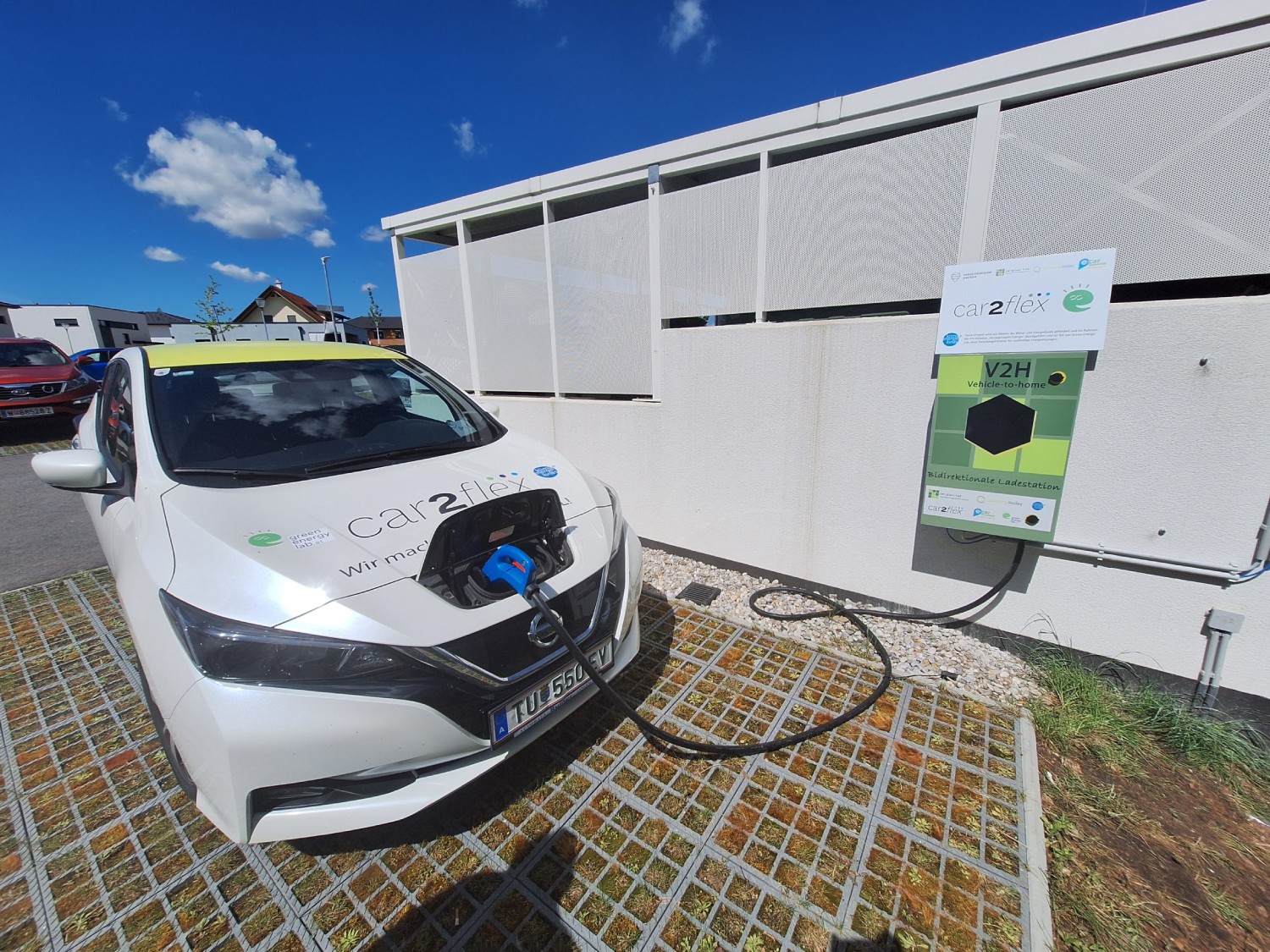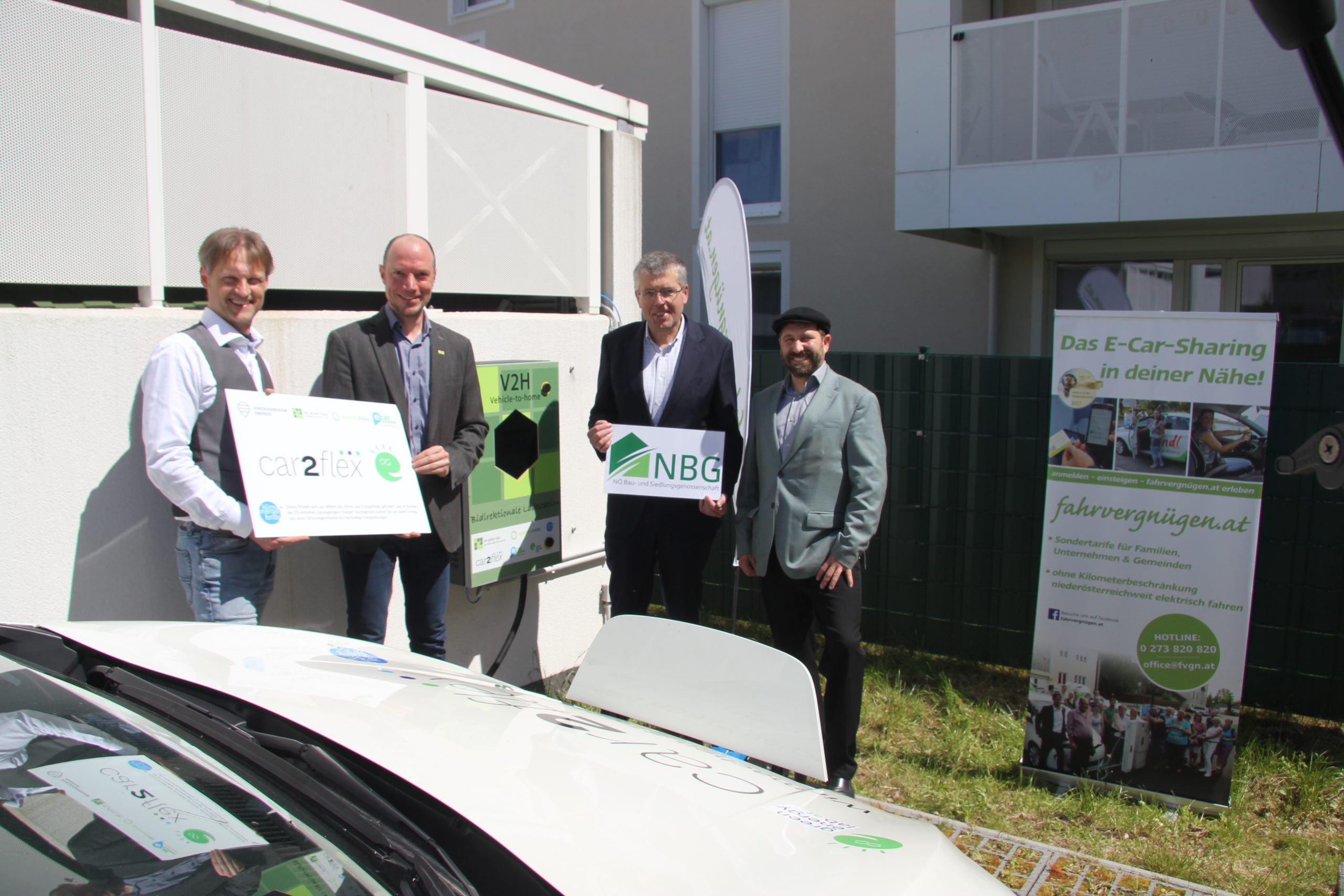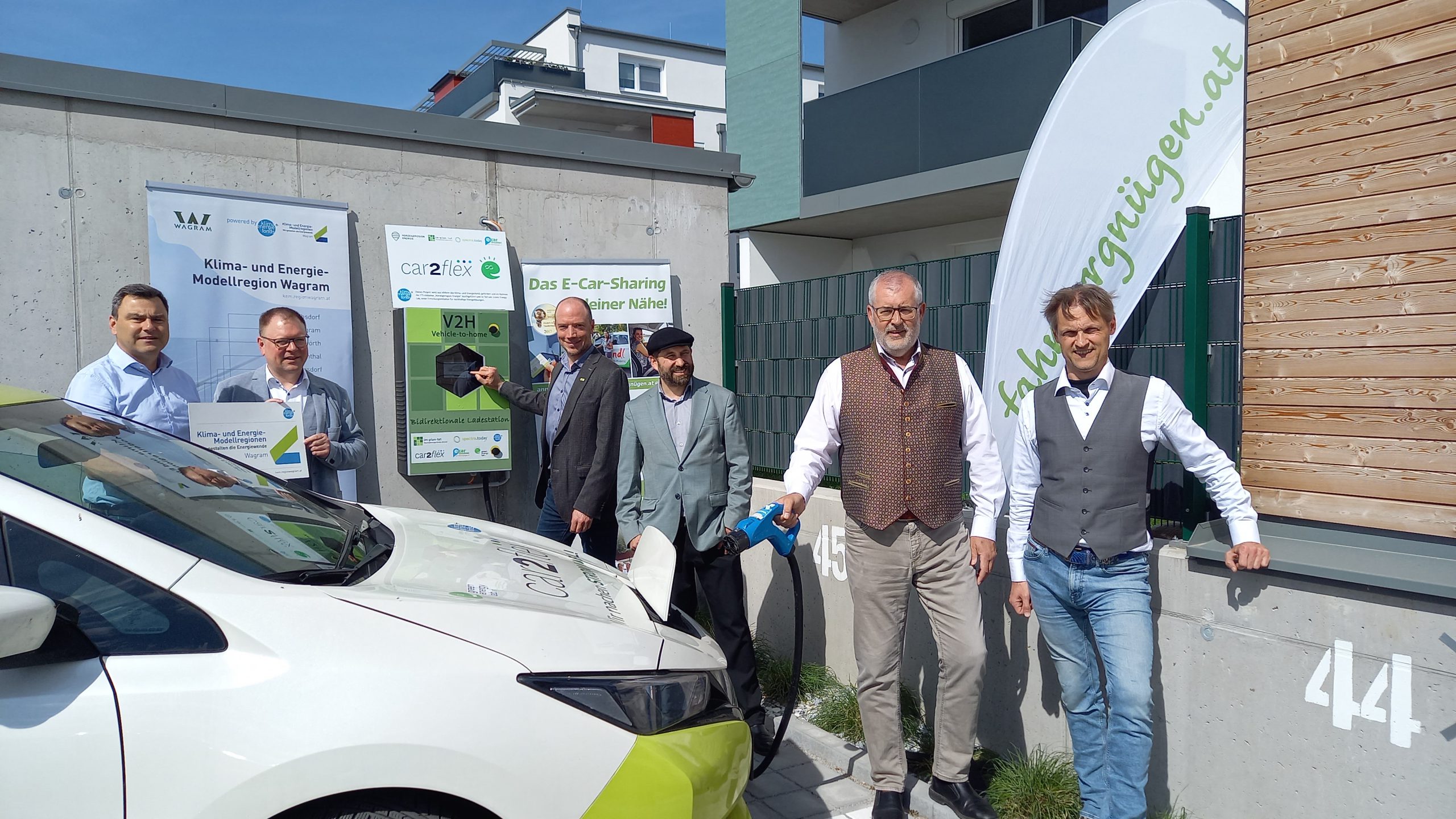Car sharing with added value
Bidirectional charging: Austria-wide showcase project Car2Flex with two new demo locations in Stockerau and Absdorf.

© Green Energy Lab
2 May 2024 – Many people are already aware that using a car-sharing vehicle can not only replace a second car and thus massively reduce the strain on your wallet, but is also an environmentally friendly alternative. In Lower Austria, however, an Austria-wide pilot project will now be realised from May as part of the “Car2Flex” research project, which will set new standards for future car sharing services in many respects.
Your own (second) car: freedom or burden?
Whether for delivery and collection services, shopping trips or visits to the doctor, the classic second car is only used for an average of 30 minutes a day. And this is for short distances and at predictable times of day. According to Verkehrsclub Österreich (VCÖ, Austrian Transport Club), the proportion of second cars in Lower Austria was already just over 40 percent in 2020. This is despite the fact that the classic second car is an immense, but often still underestimated, cost factor. As part of the Austria-wide research project “Car2Flex”, the declared aim is now to create offers in cooperation with housing developers that meet the requirements of users for car sharing and thus make the second car superfluous.
Thinking energy and mobility together!
For the first time, the pilot project enables the optimised use of renewable energies through smart charging and discharging of electric cars. Bidirectional charging plays a central role in this context: In this way, not only is the vehicle charged with electricity from the photovoltaic system, but it can also release electricity when required – at night, for example – and supply electrical consumers in the house with the help of the vehicle battery. This means that the battery is utilised twice – for mobility and power supply!
 (from left) DI Matthias Zawichowski (Verein fahrvergnügen.at / im-plan-tat Raumplanungs GmbH & CoKG), DI Matthias Komarek (Energie- und Umweltagentur des Landes Niederösterreich), Dir. Martin Schuster (Obmann und Vorstandsvorsitzender der NÖ Bau- und Siedlungsgenossenschaft), Ing. Mag. Ludwig Fliesser (Forschungsinitiative Green Energy Lab) © Raumplanungsbüro im-plan-tat
(from left) DI Matthias Zawichowski (Verein fahrvergnügen.at / im-plan-tat Raumplanungs GmbH & CoKG), DI Matthias Komarek (Energie- und Umweltagentur des Landes Niederösterreich), Dir. Martin Schuster (Obmann und Vorstandsvorsitzender der NÖ Bau- und Siedlungsgenossenschaft), Ing. Mag. Ludwig Fliesser (Forschungsinitiative Green Energy Lab) © Raumplanungsbüro im-plan-tat
Two of the first locations in Austria where a bidirectional charging station is now being used for car sharing are in Stockerau at Gustav Mahler Promenade 4 and in Absdorf at the newly built “Ingeborg Meier Wohnpark” residential complex.
Mobility must remain affordable
The realisation of such an offer is made possible by the support of innovative housing developers who recognise the importance of future-oriented forms of mobility and want to use them for their tenants: “Mobility is one of the major challenges for young families – both financially and ecologically. That’s why we are very keen to support this pilot project,” says Dir. Martin Schuster, Chairman and CEO of NÖ Bau- und Siedlungsgenossenschaft (Lower Austrian building and housing co-operative).
“Rising living costs mean that young families in particular have to pay more attention to their expenses. However, mobility must remain affordable – which is why we are very keen to support this pilot project,” emphasises Ing. Hannes Kaiser, Managing Director of Bau-, Wohnungs- und Siedlungsgesellschaft Kirchberg am Wagram (Building, housing and settlement company Kirchberg am Wagram).

(v.l.) DI Stefan Czamutzian MA (Region Wagram), Bgm. Franz Aigner (Obmann Region Wagram), DI Matthias Komarek (Energie- und
Umweltagentur des Landes Niederösterreich), Ing. Mag. Ludwig Fliesser (Forschungsinitiative Green Energy Lab), Bgm. Dir. Franz Dam
(Bürgermeister Absdorf), DI Matthias Zawichowski (Verein fahrvergnügen.at / im-plan-tat Raumplanungs GmbH & CoKG)
© Raumplanungsbüro im-plan-tat
From May 2024, an electric Nissan Leaf will therefore be available to all tenants at Gustav Mahler Promenade 4 in Stockerau and Wiesenstraße 1 in Absdorf, which can be used for as little as €7.50 per hour. This mobility offer is operated by the mobility association “fahrvergnügen.at” in cooperation with the technical office im-plan-tat.
The projects are supported by the Energy and Environment Agency of Lower Austria (eNu) and a large number of regional partners. In Absdorf, these include both the Klima- und Energiemodellregion Wagram (Climate and energy model region Wagram) and Marktgemeinde Absdorf (market town of Absdorf). The chairman of the region, Franz Aigner, emphasises: “The dual use of electricity storage offers many opportunities in terms of environmental protection and climate change. Electric car sharing services with new utilisation options are of great importance here. It is particularly pleasing that the provider fahrvergnügen.at is a mobility association from our region.”
The mayor of Absdorf, Franz Dam, is also convinced by the promising utilisation options: “The possibility of using the vehicle for our MIA transport service or meals on wheels is a welcome plus! And as Chairman of Energiegemeinschaft Wagram, with which we have set ourselves the goal of linking innovative forms of energy and mobility even more closely, the new car sharing service is an important milestone for us.”
Car2Flex – Smart optimisation of the electromobility of tomorrow
The Car2Flex lead project, which is funded by the Climate and Energy Fund, is dedicated to three different user groups with regard to electromobility: private users, e-vehicle fleets (e.g. in companies) and e-car sharing in multi-party apartment blocks. The focus is on the question of how – in line with the mobility needs of the respective groups – the increasing share of electric mobility can best be integrated. The Car2Flex concepts are also intended to create new economic incentives. For example, with solutions that increase the self-consumption of PV electricity (PV = photovoltaics) through intermediate storage in the battery of a vehicle. This optimised, flexible battery use can increase the proportion of renewable energy generation and use and save costs.
“The Car2Flex project focuses on the optimal integration of electromobility into the energy grid and the use of electric car batteries as grid-serving electricity storage or intermediate storage for households and energy communities. We are proud that the foundation stone for this project was laid during an ideas workshop at Green Energy Lab and that the joint efforts of science, technology providers and energy supply companies are now bearing fruit,” says Andrea Edelmann, Spokeswoman of the Executive Board of Green Energy Lab and Head of Innovation, Sustainability and Environmental Protection at the EVN Group.
More information about the Car2Flex project.
